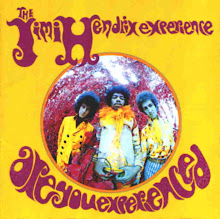 Every rock & roll generation needs reminding of why it picks up a guitar in the first place, and four non-brothers from the borough of Queens had a concept that was almost too perfect. Their look -- ripped jeans, tight T-shirt, high-top sneakers, bowl haircut and a black motorcycle jacket -- was a cartoon version of rock's tough-guy ethos. When they first started, they played what they knew how to play, which wasn't much, and worked it to their advantage. They opted for speed rather than complexity, they aspired to be the Beach Boys, Alice Cooper and the Bay City Rollers, and their rotational three chords and headlong lunge kept them skidding through the simpleton catchphrases of their singalongs.
Every rock & roll generation needs reminding of why it picks up a guitar in the first place, and four non-brothers from the borough of Queens had a concept that was almost too perfect. Their look -- ripped jeans, tight T-shirt, high-top sneakers, bowl haircut and a black motorcycle jacket -- was a cartoon version of rock's tough-guy ethos. When they first started, they played what they knew how to play, which wasn't much, and worked it to their advantage. They opted for speed rather than complexity, they aspired to be the Beach Boys, Alice Cooper and the Bay City Rollers, and their rotational three chords and headlong lunge kept them skidding through the simpleton catchphrases of their singalongs.They posited themselves unashamedly against the enigmatic mind games of progressive rock, the long solos, the Ring Cycle lyrics and symphonic synthesizers. Not for them the miscegenation of other musics; the Ramones were pure, unadulterated -- and hardly adult, in their adolescent concerns of sniffing glue and beating on brats with a baseball bat, even if the brats were themselves. Their only-child sibling rivalry meshed like any television reality show, clocking in at under half an hour, with a ready-made laugh track. Johnny was the stern older brother, disciplined, military; Dee Dee was the blunt instrument, the Ramone who took it to the corner of Fifty-third and Third; Tommy was the producer, familiar with the byways of the music business, and like any good producer, he knew that you build a great track from the drums out. Joey was the beating heart.
 The Ramones had their act so together that they would change it only in increments for two decades after they took it out of the CBGB nest in 1975. They were easily understood, translatable. When the band got to England on Independence Day 1976, returning the favor of the English Invasion in a fun-house mirror, the die was cast, punk rock and anarchy tangling, a frontal assault on here-we-go-again pop subculture.
The Ramones had their act so together that they would change it only in increments for two decades after they took it out of the CBGB nest in 1975. They were easily understood, translatable. When the band got to England on Independence Day 1976, returning the favor of the English Invasion in a fun-house mirror, the die was cast, punk rock and anarchy tangling, a frontal assault on here-we-go-again pop subculture.The Ramones always believed in their music's message of self-deliverance. They celebrated rock & roll, patriotic flag-wavers, simultaneously harking backward and forward. Their music wasn't angry, though it did have firepower and relentless energy. If anything, the Ramones affirmed that if they could do it, you could do it; just be resolute. Count to four.
They've all left the band or left the planet by this time, and this is a say-hey to Joey and Dee Dee, who are now immortal in more ways than one. But when I think of a Ramones moment, I remember not the early years -- when the bands played for each other on the Bowery and each was like a different world -- but a late afternoon in May, somewhere in New England, a daylong festival, maybe the early Eighties, sun shining, a holiday weekend. I'm standing backstage with Johnny, and we're talking about nothing much, where we've been, guitars we've known, the Red Sox, and finally the conversation stops, and we just look around, quiet in the midst of electric noise, seeing where rock & roll has brought us on this beautiful afternoon, playing the music we love.






